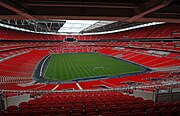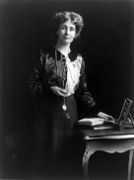 |
 |

| |
The United Kingdom of Great Britain and Northern Ireland, commonly known as the United Kingdom (UK) or Britain, is a country in Northwestern Europe, off the coast of the continental mainland. It comprises England, Scotland, Wales, and Northern Ireland. The UK includes the island of Great Britain, the north-eastern part of the island of Ireland, and most of the smaller islands within the British Isles. Northern Ireland shares a land border with the Republic of Ireland; otherwise, the United Kingdom is surrounded by the Atlantic Ocean, the North Sea, the English Channel, the Celtic Sea, and the Irish Sea. The total area of the United Kingdom is 94,354 square miles (244,376 km2), with an estimated population of 67,596,281 people in 2022. The capital and largest city of both England and the United Kingdom is London, whose wider metropolitan area is the largest in Western Europe, with a population of 14.9 million. The cities of Edinburgh, Cardiff, and Belfast are the national capitals of Scotland, Wales, and Northern Ireland, respectively. Other major cities include Birmingham, Manchester, Glasgow, Bristol, Liverpool, Sheffield, Newcastle and Leeds.
Inhabited continuously since the Neolithic, the lands making up the modern-day UK have remained ethnically and culturally diverse. In the transitional period from the Danelaw in the late 9th century to the Norman Conquest culminating in 1066, the modern British people began to shape up, followed by the establishment of parliamentarism in the mid-13th century in both England and Scotland. With the end of the Wars of the Roses the English state stabilised, consolidated and grew ever more powerful, resulting by the 16th century in the annexation of Wales and domination of Scotland by an English ruler. Subsequently, colonies across the globe were established. Over the course of the 17th century, the role of the British monarchy was reduced, particularly as a result of the English Civil War, and the parliament in Westminster took on a leading role. In 1707, the Kingdom of England and the Kingdom of Scotland united under the Treaty of Union to create the Kingdom of Great Britain. The Acts of Union 1800 incorporated the Kingdom of Ireland to create the United Kingdom of Great Britain and Ireland in 1801. Most of Ireland seceded from the UK in 1922 as the Irish Free State, and the Royal and Parliamentary Titles Act 1927 created the present United Kingdom.
The UK became the first industrialised country and was the world's foremost power for the majority of the 19th and early 20th centuries, particularly during the "Pax Britannica" between 1815 and 1914. At its height in the 1920s, the British Empire encompassed almost a quarter of the world's landmass and population, and was the largest empire in history. However, its involvement in the First World War and the Second World War damaged Britain's economic power and a global wave of decolonisation led to the independence of most British colonies. British influence can be observed in the legal and political systems of many of its former colonies, and British culture remains globally influential, particularly in language, literature, music and sport. English is the world's most widely spoken language and the third-most spoken native language. (Full article...)
The Webley Revolver was, in various marks, the standard-issue service pistol for the armed forces of the United Kingdom, the British Empire, and the Commonwealth from 1887 until 1963. The Webley is a top-break revolver with automatic extraction; breaking the revolver open for reloading also operates the extractor, removing the spent cartridges from the cylinder. The Webley Mk I service revolver was adopted in 1887, but it was a later version—the Mk IV—which rose to prominence during the Boer War of 1899–1902. The Mk VI, introduced in 1915 during World War I, is perhaps the best-known model. Webley service revolvers are among the most powerful top-break revolvers ever produced, firing the .455 Webley cartridge. Although the .455 calibre Webley is no longer in military service, the .38/200 Webley Mk IV variant is still sporadically in use as a police sidearm in a number of countries. (Full article...)
Douglas Jardine (1900–1958) was an English cricketer and captain of the England cricket team from 1931 to 1933–34. A right-handed batsman, he played 22 Test matches for England, captaining the side in 15 of those matches, winning nine, losing one and drawing five. Jardine is best known for captaining the English team during the 1932–33 Ashes tour of Australia, in which his team employed Bodyline tactics against Donald Bradman and other opposing Australian batsmen. A controversial figure among cricketers, Jardine was well known for his dislike of Australian players and crowds and was unpopular in Australia, particularly for his manner and especially so after the Bodyline tour. He retired from all first-class cricket in 1934 following a tour to India. Jardine was a qualified solicitor but did not work much in law, working in banking and, later on, journalism. He joined the Territorial Army in the Second World War, most of which he spent in India. After the war, he worked as a secretary to a paper manufacturer and returned to journalism. While on a business trip in 1957, he became ill with what proved to be lung cancer and died aged 57 in 1958. (Full article...)
- Visit the British Wikipedians' notice board.
- The noticeboard is the central forum for information and discussion on editing related to the United Kingdom.
- Comment at the British deletion sorting page.
- This page lists deletion discussions on topics relating to the United Kingdom.

- ... that vehicles crossing Terras Bridge pass over a tidal river, an ungated level crossing, and the remains of a canal?
- ... that before Fred Thomas became an MP, he was the Royal Marines' light heavyweight boxing champion?
- ... that the 1st Armoured Division of the British Army chose a white rhinoceros on a black oval as their insignia?
- ... that former Scottish Conservative leader Ruth Davidson said that she would swim in Loch Ness naked if the SNP won more than 50 seats at the 2019 United Kingdom general election?
- ... that even though Australian citizens are no longer British subjects, they can still vote in elections and stand for parliament in the United Kingdom?
- ... that South African nurse Stella Madzimbamuto filed an appeal in 1968 with the Privy Council of the United Kingdom that resulted in the Rhodesian government being declared illegal?
- 19 August 2024 –
- One person is killed and fifteen others are rescued when the United Kingdom-flagged Bayesian superyacht sinks near Palermo, Italy, due to a waterspout. Six others remain missing, including British entrepreneur Mike Lynch. (AP)
- A rocket engine for Rocket Factory Augsburg's launch vehicle RFA One explodes during a test launch at the SaxaVord Spaceport in Scotland, United Kingdom. (BBC News)
- 15 August 2024 – Russian invasion of Ukraine
- The United Kingdom says that Ukraine can use British weaponry, including Challenger 2 tanks, for its military operations inside Russia. (Sky News)
- 10 August 2024 – 2024 United Kingdom riots
- Thousands of anti-racism protesters march in cities across the United Kingdom to protest against far-right riots, political figures, and the Reform UK party. (DW)
- A petrol bomb is thrown towards an Islamic centre in Newtownards, County Down, Northern Ireland. (BBC)
- 7 August 2024 – 2024 Iran–Israel conflict, Israel–Hezbollah conflict
- Egypt and the United Kingdom issue NOTAM alerts and order their airlines to avoid Iranian and Lebanese airspaces. (Reuters)
The following Wikimedia Foundation sister projects provide more on this subject:
-
Commons
Free media repository -
Wikibooks
Free textbooks and manuals -
Wikidata
Free knowledge base -
Wikinews
Free-content news -
Wikiquote
Collection of quotations -
Wikisource
Free-content library -
Wikiversity
Free learning tools -
Wikivoyage
Free travel guide -
Wiktionary
Dictionary and thesaurus





















































































































